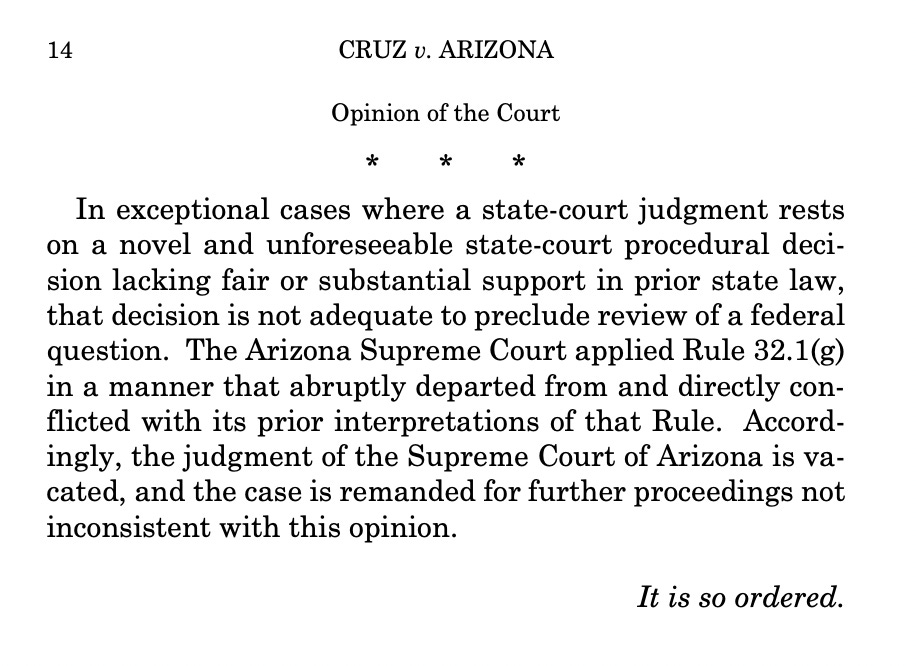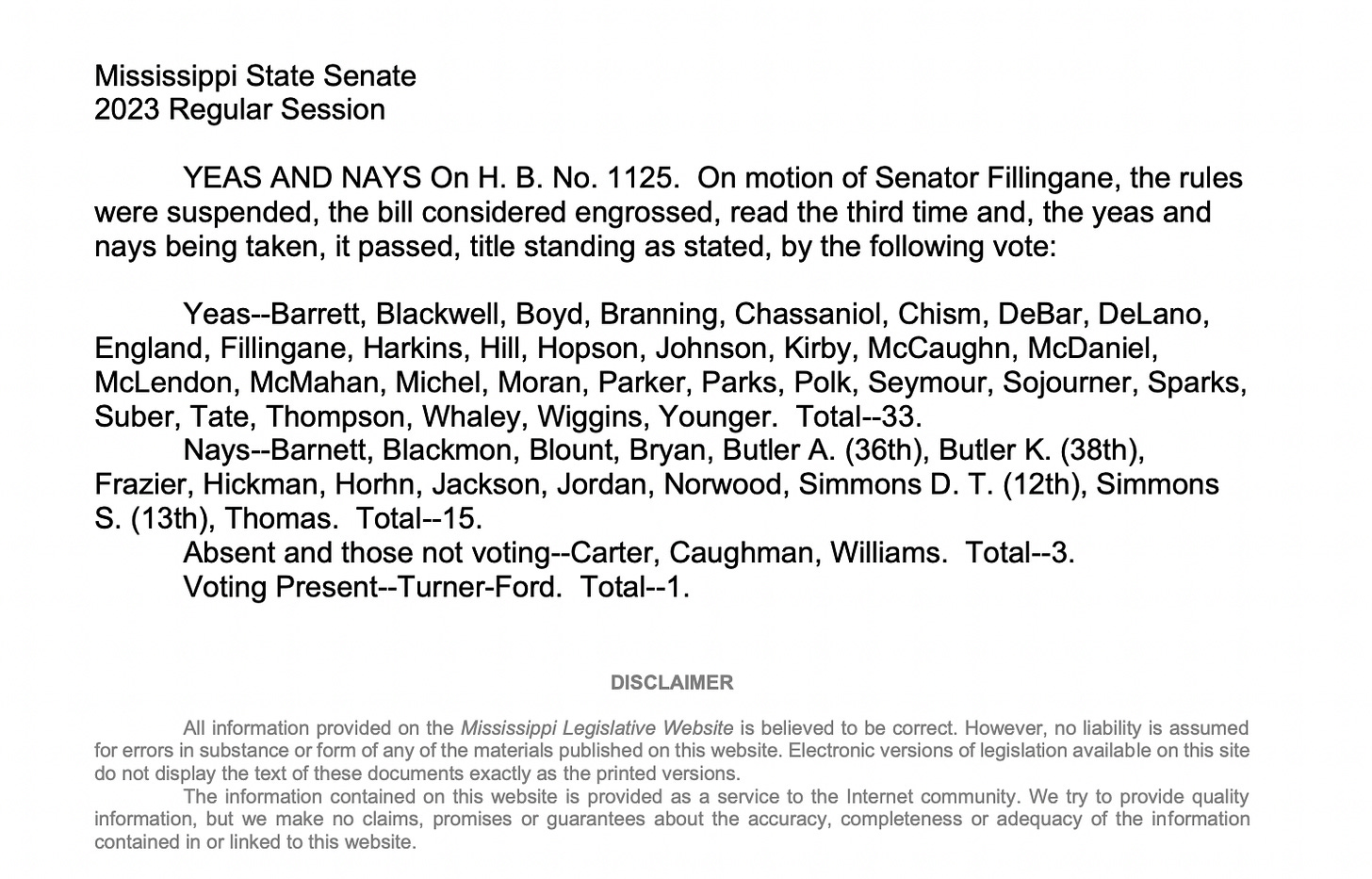The precarious perch for liberal SCOTUS wins
Narrow wins in cases on the periphery, even as the court denies other significant cases on individuals' rights. Also: Florida executions. And: A fourth anti-trans bill is set to become law.
On Wednesday, the Supreme Court released rulings in three cases, including a 6-3 win for an employee in a labor case and a 5-4 win for a capital defendant in a death penalty case.
Those were wins for the left, to be sure, as Neal Katyal, who argued in the Arizona capital case for the defendant, John Montenegro Cruz, stated on Twitter about his case.
The Cruz case addressed the rare circumstance when a state’s claim that its basis for rejecting a criminal defendant’s claim was based on an “adequate and independent” state ground is insufficient and should fail. Here, Justice Sonia Sotomayor wrote the opinion for the U.S. Supreme Court, holding that the Arizona Supreme Court went too far, ignoring its past cases, to deny relief to people sentenced to death in the state.
The labor law case, meanwhile, delved into whether a highly paid oil rig employee, who the company identified as an executive and was paid more than $200,000 a year could still get overtime pay. He gets overtime pay, the court ruled, because he is not a salaried employee.
In short, they were both cases addressing issues at the periphery, but, they were wins for the left.
In addition to the decisions, they and Tuesday’s orders — when the court announced dozens of cases that it wouldn’t be hearing — highlighted just how precarious the legal ground is even for cases where the “right” legal outcome might seem obvious.
While there will be occasional wins for the left, they will most often come at the margins. And other marginal cases, even with extreme facts, will get by without Supreme Court review altogether.
First, the justices declined to hear a case out of Ohio, where a man tried to sue the Parma Police Department after the department arrested and jailed him for four days because they didn’t like his Facebook page. The justices left a particularly chilling lower court opinion from Judge Amul Thapar — former president Donald Trump’s first appeals court nominee — in place, a “qualified immunity” win for police that could chill police criticism. (This was the case that prompted The Onion’s brief.)
The justices also declined to hear a closely watched case challenging the NSA’s so-called “upstream” surveillance.
Finally, Jordan Rubin highlighted at MSNBC a third case the justices turned down — the only case on Tuesday in which any justice wrote to express their opposition. Justice Ketanji Brown Jackson, joined by Justice Sonia Sotomayor, dissented from the decision not to hear the case about, as Rubin explained, “plea bargaining and ineffective assistance of counsel.”
Here, Jackson wrote, the appeals court below (the US Court of Appeals for the Eleventh Circuit), made it virtually impossible, “because it applied a bright-line rule that prejudice cannot be shown in the absence of a plea offer.” That presented a circuit split, she continued, and the court should have resolved it by taking the case.
In this era, however, such an obvious candidate for Supreme Court review is not taken, Davis gets no relief, and others after him will face similar challenges based solely on the circuit in which their case is heard.
FLORIDA EXECUTION SET FOR TODAY: Florida is set to execute Donald Dillbeck at 6 p.m. ET Thursday. It is set to be the first execution carried out in the state since the summer of 2019.
Among Dillbeck’s legal claims is a claim that it should be unconstitutional for Florida to execute people whose jury did not unanimously agree that the defendant should have been sentenced to death. Here, the jury was only 8-4 in support of a death sentence, but the judge nonetheless sentenced Dillbeck to death.
This is the implication of a pair of Supreme Court rulings in recent years, but the Supreme Court has never explicitly ruled on the question — and no states currently allow for new death sentences without a unanimous jury.
Nonetheless, on Wednesday afternoon, the Supreme Court denied Dillbeck’s request for a stay of execution so that the court could hear his case. It gave no reasoning for its decision, and no justices announced a dissent.
Florida Gov. Ron DeSantis — an expected presidential candidate — recently proposed Florida adopting a rule that would only require an 8-4 jury vote to sentence a person to death.
While that was allowed when Dillbeck was tried, it has not been Florida’s practice in recent years — due to both U.S. and Florida supreme court decisions.
MISSISSIPPI ANTI-TRANS BILL: The fourth anti-trans bill passed in 2023 is set to be signed into law.
On Tuesday, Mississippi's Republican Senate passed a ban on gender-affirming medical care for minors (H.B. 1125). The bill, which already pased the House, will go to Republican Gov. Tate Reeves now. He already has said he plans to sign the bill.
The measure will be the third bill barring gender-affirming medical care to be passed into law this year (along with Utah and South Dakota).
WHO IS BEING HARMED HERE?: Erin Reed and Ari Drennen, two of the people most fastidiously covering the anti-LGBTQ efforts taking place across the country today, highlighted a simple moment of humanity on CNN.











In Mississippi, the age of majority is 21. This is codified under the Mississippi Code title 1, S1-3-27. A 20-year old who can join the military, vote, be convicted as an adult, and engage in sexual relations isn’t old enough to determine their gender identity. Parental consent means nothing, although you can drink at the age of 18 with parental consent and get married at 15 with parental consent.